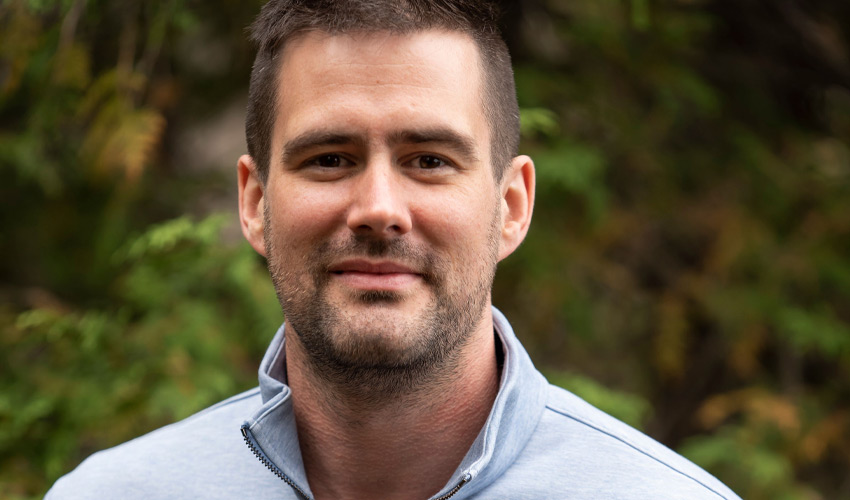MRU historian examines enduring 'thrifty gene' myth in new book

One of the things that surprised Hay while writing the book was that Canadian clinical guidelines and medical professionals continued to cite the thrifty gene hypothesis long after the researchers involved in the studies had retracted their findings.
A new book by an MRU expert in Indigenous studies explores metabolic myths, scientists exploiting Indigenous subjects and severe inequities in Canadian health care that continue today.
Inventing the Thrifty Gene: The Science of Settler Colonialism (University of Manitoba Press), by Dr. Travis Hay, PhD, assistant professor of humanities, examines the relationship between science and settler colonialism through the lens of “Aboriginal diabetes” and the faulty “thrifty gene” hypothesis, which posits that Indigenous people are genetically predisposed to type 2 diabetes and obesity due to their alleged hunter-gatherer genes.
Hay says he wanted to write a historical study of Canadian settler colonialism that focused on how doctors, nurses, scientists and medical researchers have been central to the administration of federal Indian policy, the violence of residential schools and the attempted erasure of the social determinants of health on-reserve.
“Experimentation on Indigenous Peoples is an enduring endemic aspect of Canadian medical history, and this is a ‘truth’ with which too few Canadians have reconciled,” he says.
New to MRU this fall, Hay was born and raised in Thunder Bay where he completed his bachelor’s and master’s in history at Lakehead University. He received a PhD in Canadian history from York University before returning to Thunder Bay to teach and conduct research as a postdoctoral fellow. His focus is Canadian federal Indian policy and settler colonialism.
Hay’s book begins with Charles Darwin’s travels and his observations on the Indigenous peoples he encountered, setting the imperial context for Canadian histories of medicine and colonialism. It continues in the mid-20th century with a look at nutritional experimentation during the long career of Percy Moore, Canada’s medical director of Indian Affairs from 1946 to 1965. Hay then turns to American geneticist James Neel’s invention of the thrifty gene hypothesis in 1962 and Robert Hegele’s reinvention of and application of the hypothesis to the Sandy Lake First Nation in northern Ontario in the 1990s.
One of the things that surprised Hay while writing the book was that Canadian clinical guidelines and medical professionals continued to cite the thrifty gene hypothesis long after the researchers involved in the studies had retracted their findings.
“In other words, metabolic myths about Indigenous Peoples remained in the registers of Canadian science and medicine long after they had been theoretically and empirically challenged, debunked and rejected. In this way, ‘Aboriginal diabetes’ is analogous to what used to be called ‘Indian tuberculosis,’ in that settlers are blaming Indigenous biologies, not colonial policies, for poor health on-reserve,” Hay says.
Indigenous scholars and community members have been incredibly supportive of Hay’s research. “They are aware that medical experimentation and scientific racism have not been widely understood by Canadians as a key aspect of federal Indian policy.”
Inventing the Thrifty Gene describes how this settler science was responded to and resisted by Indigenous leadership in Sandy Lake First Nation, which used monies from the thrifty gene study to fund wellness programs in their community.
As Hay points out, while First Nations communities in Canada have historically lacked access to clean water, affordable food and equitable health care, they have never lacked access to well-funded scientists seeking to study them.
Anishinaabe Elder Teri Redsky Fiddler was especially supportive during the process of researching and writing the book, leading Hay to dedicate the work to the memory and legacy of her late husband Josias Fiddler Sr. — a former chief of Sandy Lake First Nation who undertook a hunger strike in a northern hospital in 1988 to protest the treatment of his people by doctors, medical professionals and researchers.
During the UNMATV Colloquium 2021-22, held by the University of Manitoba’s Department of Native Studies and featuring a discussion of the book, Redsky Fiddler said it is difficult to discuss the topic, but important.
“I think about the work my late husband did throughout his life. I always want to make sure that all the work he did in his lifetime is not in vain. Even though it’s hard to talk about it, I want his story to be told and I’m really grateful to Travis for honouring my late husband in his book,” she said.
“My husband fought for health issues and those issues are still issues today … We need to keep on advocating and fighting.”
Read more about Indigenous studies at Mount Royal
Nov. 22, 2021 — Peter Glenn
Media request contact information.
Have a story idea? Please fill out this form.

